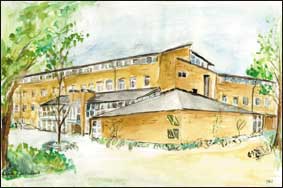 Postal address: Box 52, SE-221 00 Lund, Sweden
Postal address: Box 52, SE-221 00 Lund, Sweden
Visiting address: Paradisgatan 5
Web page: http://www.svet.lu.se/english_pages/
Contact person: Professor Catarina Kinnvall, phone: +46 (0)46 222 8094. Personal web page.
Research connected to South Asia:
During the last few years, research concerned with the Third World has commanded increased attention. The Department has received funding by Sida, the Swedish International Development Cooperation Agency, to further strengthen this field of research. A number of PhD candidates are funded by Sida grants, in the last few years several dissertations have been presented within the area; many of them based on support from Sida/SAREC. In addition to more traditional interests in developmental aid and international organization, research interests now include democratization, the role of civil society, human rights, nationalism, ethnicity , different political regimes and gender in Third World countries.
Many outh Asia related seminars have been organised during the last years, many of them on collaboration with SASNET. In October 2010, a large group of teachers and professors from the department, including Associate Professors Anders Sannerstedt, Tomas Bergström and Catarina Kinnvall, made a study tour to India.
They visited several research institutes both in Delhi and Mumbai. The department has established collaboration with Tata Institute of Social Sciences (TISS) in Mumbai and the School of International Studies at Jawaharlal Nehru University (JNU) in Delhi.
Prof Swaran Singh from JNU’s Center for International Politics, Organisation and Disarmament visited Lund University soon after, and held a SASNET lecture on Friday 17 December 2010, talking about ”India’s Disarmament Policy: Past, Present, Future”. More information.
The Dept. of Political Science has also started to collaborate with the Institute for Defense Studies and Analysis (ISDA) in New Delhi, India. In September 2010, Associate Professor Jagannath Prasad Panda from ISDA held a lecture at the department in Lund on ”The Pattern of Sino-Indian Relations: Evaluating the Strategic Discourse”, a seminar jointly organised by SASNET. More information about the seminar.
 Catarina Kinnvall (photo to the right) is an experienced researcher working on several projects related to India and China. She defended her doctoral dissertation entitled ”Cultural Diffusion and Political Learning – The Democratization of China” in 1995. Dr. Kinnvall was a member of SASNET’s board from the launch of SASNET in 2001 till the board was dissolved in September 2010.
Catarina Kinnvall (photo to the right) is an experienced researcher working on several projects related to India and China. She defended her doctoral dissertation entitled ”Cultural Diffusion and Political Learning – The Democratization of China” in 1995. Dr. Kinnvall was a member of SASNET’s board from the launch of SASNET in 2001 till the board was dissolved in September 2010.
Catarina Kinnvall coordinates the Masters programme in Global Studies at Lund University, and also teaches in the Masters Programme in Asian Studies at the Centre for East and South East Asian Studies (ACE). She is the former Vice-President of the International Society of Political Psychology (ISPP).
Her research interests are focused on issues of globalization, security, religion, nationalism and political psychology. Empirically her work deals with Asia and Europe, with a particular focus on issues of security and religion in India, Pakistan and among Muslims in the West. She has done extensive field work in China, India, Pakistan and Europe and has been a visiting scholar and lecturer at University of California, Irvine, Texas A&M, Hong Kong University and Jawaharlal Nehru University.
During the last decade she has written a large number of books, articles and conference papers/presentations, e g a text about “Gender, Multiculturalism and Religious Discourse(s): Women as symbols in Hindu nationalism” (together with Dr. Sidsel Hansson, Centre for East and South East Asian Studies, Lund University) in a volume titled ”Gendered Inequalities: Gender Research on Asia” (Helle Rydström (ed.), NIAS Press, 2006); and also in 2006 a text about “Civilizations, Neo-Gandhianism and the Hindu Self” (in a Palgrave volume titled ”Writing Civilizations”, edited by Martin Hall and Patrick Jackson. Go for a full list of Catarina Kinnvall’s publications.
In January 2011, SASNET launched an Interdisciplinary South Asia Seminar series at Lund University, in the form of Brown bag lunch seminars. The aim is to present and disseminate the eminent South Asia related research that is carried out in so many departments at Lund University.
– The first seminar was held on Tuesday 18 January 2011, 12–13. Catarina Kinnwall talked about ”Religion, Nationalism and Discourses on Terror in South Asia”. More information on the 2011 Brown Bag seminars.
During the Fall semester 2012, Catarina Kinnvall spent a sabbatical at Melbourne University in Australia.
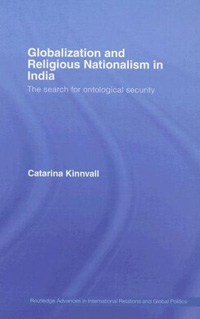 In January 2007, she published a monograph titled ”Globalization and Religious Nationalism in India. The search for ontological security”, published in the Routledge Advances in International Relations and Global Politics series. The book explores the effects of globalization in India and the problem of identity formation, this book contributes to the theoretical and empirical debate on identity, globalization, religious nationalism and (in)security. The author puts forward a new approach based on political psychology, to interpret identity construction, which is seen as an individualized process where interactions of the global and the local are intimately implicated. Thereby, this book presents a psychological analysis of how increased insecurity affects individuals’ and groups’ attachments to religious nationalism in an era of globalization.
In January 2007, she published a monograph titled ”Globalization and Religious Nationalism in India. The search for ontological security”, published in the Routledge Advances in International Relations and Global Politics series. The book explores the effects of globalization in India and the problem of identity formation, this book contributes to the theoretical and empirical debate on identity, globalization, religious nationalism and (in)security. The author puts forward a new approach based on political psychology, to interpret identity construction, which is seen as an individualized process where interactions of the global and the local are intimately implicated. Thereby, this book presents a psychological analysis of how increased insecurity affects individuals’ and groups’ attachments to religious nationalism in an era of globalization.
Together with Dr. Sidsel Hansson, she has also been involved in planning an independent, interdisciplinary 15 ECTS researcher training course on ”Religion, Conflict and Identity in South and Southeast Asia”. It ran for the first time in October 2006, and aimed at supplying students with overviews of the broader religious developments in South and South East Asia. Supervision was given in the form of seminars, held both in Lund and in Copenhagen. More information on the course.
Some years ago, Dr. Kinnvall was involved in a research project called ”Globalization and the State in India”, in collaboration with Associate Professor Bishnu Mohapatra, Centre for Political Studies, Jawaharlal Nehru University, New Delhi, India. This project was given a planning grant by SASNET in August 2002 (more information). She has also involved in a research project on ”In the Name of Tradition: Globalization and Dislocation in Postcolonial Societies”, which is more specifically concerned with the relationship between globalization, religion, nationalism and gender in India.
Christina Kinnvall has also been involved in another research collaboration project dealing with globalization in Asia, with Assistant Professor Kristina Jönsson at the same department (who is presently working on a project called ”Issue without Boundaries: HIV/AIDS in Southeast Asia”). Their joint research resulted in a an edited volume titled ”Globalization and Democratization in Asia: The Construction of Identity”, that was published by Routledge in 2002.
More information on Catarina Kinnvall’s research projects.
Catarina Kinnvall has been involved in collaborative research on Muslim Diaspora with the Pak Institute for Peace Studies (PIPS) in Islamabad, Pakistan (more information below), and in March 2009 she delivered a lecture there on “Foreign Policy: Multiculturalism, Return Visits and young Muslims in Europe”. More information.
Catarina has also been involved in teaching at the Seventh South Asian Orientation Course in Human Rights and Peace Studies, organised in Kathmandu, Nepal, in 2008. The programme was organised by the South Asia Forum for Human Rights’ (SAFHR). More information.
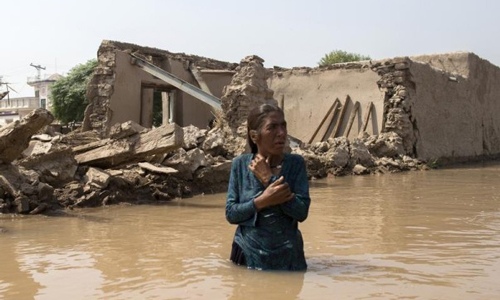
 On 4 November 2014, Helle Rydström from the Dept. of Gender Studies, Lund University, was granted a development research grant from the Swedish Research Council (total amount SEK 4.0 m in five years, 2015-19) for a Asia related project entitled ”Climate Disasters and Gendered Violence in Asia: Vulnerability and (In)Security in the Aftermath of Catastrophes in Pakistan, the Philippines, and Vietnam”. This project will be carried out in collaboration with Professor Catarina Kinnvall,; and Dr. Huong Nguyen, Lecturer Dept. of Anthropology, Hanoi University, Vietnam. The local collaboration partner in Pakistan is Professor Durre Ahmed at the Center for Studies of Gender and Culture, Lahore University. Despite attention from international aid organizations, no substantial research has been carried out on the violence inflicted upon females of particular ages, sexualities, ethnicities, and classes in the aftermath of a climate disaster. This serious lacuna will be addressed directly by this research project. The project, which is both interdisciplinary and ethnographic in character, will conduct a thorough examination of climate change related violence against women and girls. At the core of the project are three carefully selected countries, namely Pakistan, the Philippines, and Vietnam, each of which is indicative of certain tendencies in the Asia-Pacific region and which recently have been hit by climate disasters. Read the full abstract.
On 4 November 2014, Helle Rydström from the Dept. of Gender Studies, Lund University, was granted a development research grant from the Swedish Research Council (total amount SEK 4.0 m in five years, 2015-19) for a Asia related project entitled ”Climate Disasters and Gendered Violence in Asia: Vulnerability and (In)Security in the Aftermath of Catastrophes in Pakistan, the Philippines, and Vietnam”. This project will be carried out in collaboration with Professor Catarina Kinnvall,; and Dr. Huong Nguyen, Lecturer Dept. of Anthropology, Hanoi University, Vietnam. The local collaboration partner in Pakistan is Professor Durre Ahmed at the Center for Studies of Gender and Culture, Lahore University. Despite attention from international aid organizations, no substantial research has been carried out on the violence inflicted upon females of particular ages, sexualities, ethnicities, and classes in the aftermath of a climate disaster. This serious lacuna will be addressed directly by this research project. The project, which is both interdisciplinary and ethnographic in character, will conduct a thorough examination of climate change related violence against women and girls. At the core of the project are three carefully selected countries, namely Pakistan, the Philippines, and Vietnam, each of which is indicative of certain tendencies in the Asia-Pacific region and which recently have been hit by climate disasters. Read the full abstract.
More information about Swedish Research Council grants to South Asia related projects 2014.
 Prof. Helle Rydström and Prof Catarina Kinnvall participated in an International Conference on ”Re Orienting Gender: Geographies of Resistance, Agency, Violence and Desire in Asia” in New Delhi, India, organised by the Department of Geography at University of Delhi. The convener was Dr. Anindita Datta.with links to the Dept. of Gender, Lund University. SASNET supported the participation of Rydström and Kinnvall. Read the conference report by Linda Hiltmann, SASNET.
Prof. Helle Rydström and Prof Catarina Kinnvall participated in an International Conference on ”Re Orienting Gender: Geographies of Resistance, Agency, Violence and Desire in Asia” in New Delhi, India, organised by the Department of Geography at University of Delhi. The convener was Dr. Anindita Datta.with links to the Dept. of Gender, Lund University. SASNET supported the participation of Rydström and Kinnvall. Read the conference report by Linda Hiltmann, SASNET.

Dr. Ted Svensson, former Masters student and fil. mag at the department, works as an Assistant Professor at the department. From the academic year 2009-10 he has also taught at the Masters programme in Asian Studies at the Centre for East and South-East Asian Studies, Lund University. Personal web page.
In 2006, Ted Svensson joined a PhD programme at the Dept. of Politics and International Studies, Warwick University in UK, and on 23 March 2010, he defended his doctoral dissertation entitled ”Meanings of Partition: Production of Postcolonial India and Pakistan”. The thesis constitutes an analysis of the partition of British India and the ensuing state formation and state consolidation in the region. During his time at Warwick University, Ted has been supervised by Professor Shirin M. Raiand Professor Stuart Croft. The external opponent at the dissertation was Prof. Jenny Edkins from Aberystwyth University, UK.
Abstract: The thesis constitutes an attempt to conceptualise the partition and independence of India and Pakistan in terms of rupture and novelty. The event or transition, which formally occurred in August 1947, is analysed as a rare moment of openness and undecidability. It is argued that a study of the so-called transfer of power – and of the inclusion of the notions of ‘Partition’ and ‘Independence’ as key elements of Indian and Pakistani nation building – ought to contain a recognition of the labour by the political elites to overwrite the abyssal and ambiguous character of becoming independent and postcolonial. A second argument is that this overwriting was necessarily partial as it left certain groups and subject positions to populate the margins and the in-betweens of citizenship and national identity. The principal implication of the proposed theorising is that we need to adopt a new approach to the study of the partition of British India and the ensuing nation and state building – an approach that is both sensitive to the constitutive contingency and to the forceful closure that was contained in the moment of transition.
In doing the above, the thesis critically engages with literature on the various and multi-layered levels of violence that were inscribed into the politics of belonging. Particular attention is, in some sections, devoted to the Indian case. Partly in order to contest some of the conventional assumptions regarding how to conceive the events in the late 1940s and the early 1950s; partly as a consequence of the primary material that underpins much of the reasoning. In order to demonstrate and theorise the above-mentioned uncertainty regarding what independence signified to the political elites, the thesis is to a significant degree the product of archival research carried out at the National Archives of India and at the Nehru Memorial Museum and Library. The analysis, in addition, draws on a close reading of the Constituent Assembly debates in both India and Pakistan.
Ted’s general research interests include identity politics, violence, methodology, poststructuralist thought and contemporary South Asia. Ted frequently presents research papers at international conferences. He participated in the inaugural conference of the Law and Social Sciences Research Network in New Delhi, India in January 2009; and the Political Studies Association’s annual conference in Manchester, UK, April 2009. An article entitled ‘Frontiers of Blame: India’s “War on Terror”‘ was published in the journal Critical Studies on Terrorism, vol. 2, 2009.
In February 2010, he participated in the International Studies Association’s annual conference in New Orleans, USA, and presented a paper (together with Catarina Kinnvall) entitled ’Securitizing Religion: The Destabilization of Pakistan’. Ted and Catarina are also jointly working on an article entitled ’Hindu Nationalism, Diaspora Politics and Nation-Building in India’ that was supposed to be published by the Australian Journal of International Affairs during 2010.
In 2004, Ted Svensson was given the Hydén Award, for producing the best undergraduate thesis on Democratisation and Development in the Third World that year at Lund University. The Hydén Award is given every year since 2002 in honour of the renowned Prof. Göran Hydén. It is open for senior dissertation students in anthropology, economic history, economics, political science and sociology. Svensson was awarded for writing an excellent Masters thesis entitled ”Hindu Right Discourse – Hegemonic Articulation and Social Antagonism”, on the reasons behind the strong emergence of Hindutva political philosophy in India during the last 20 years.
Abstract: India has during the last two decades witnessed a substantial rise in Hindu nationalist influence. An increase in communal sentiments among the Indian population has been synchronous to the hegemonic articulation by a Hindu Right discourse. This discourse primarily revolves around the abundance of rightwing Hindu organisations connected to the Rashtriya Swayamsevak Sangh (RSS). In 1996 its political wing triumphed in the general elections for the first time in the history of independent India, mainly due to an organic crisis by the Congress party. The focal point of this thesis is to examine the phenomenon on the foundation of discourse theoretical concepts. Since the social and all identities are fundamentally lacking essence, I have tried to penetrate and reveal the emptiness that constitutes Hindu Right discourse. In its attempts to merge with the social order and establish a structured totalization in meaning it simultaneously leaves something outside. The political frontiers drawn by the discourse neglects the rights of religious minorities as well as erase internal divisions within the Hindu community. Through its time-abiding ideological work and presence in all spheres of Indian society the Hindu Right has managed to disseminate its symbolic field to every corner of the country. Today, key terms in the political field, such as ”nationalism” and ”secularism”, are gradually apprehended according to the articulatory practices of Hindu Right discourse.

Dr. Winnie Bothe is connected to the department from 1 January 2012. Only a few months earlier, on 23 September 2011, she defended her doctoral dissertation entitled ”Forming Local Citizens in Bhutan: The Traditionalization of Participation – Empowerment, Domination or Subjugation?” at the Department of Political Science, University of Copenhagen. It deals with the concept ’Gross National Happiness’, a new development model invented by a small Himalayan kingdom of Bhutan.
This development approach is seen by an increasing number of people as a refreshing alternative to the conventional development models that often take growth as their main target. But how is it actually practiced in Bhutan and how does this influence the way in which the rural inhabitants are constructed as citizens? The thesis addresses questions of how local governance reforms are diverted by national discourses on citizenship, ones that serve to traditionalize the local citizens into roles as supplicants rather than promoting self-determining citizens. Thus, even if donors have success in localizing governance it may not result in the form of citizenship donors would like to see.
The committee to assess the thesis consisted of Associate Professor Anders Berg-Sørensen, Dept. of Political Science, University of Copenhagen; Professor Emeritus Staffan Lindberg, Dept. of Sociology, Lund University; and Professor Michael Hutt, SOAS, University of London, UK. More information about the thesis.
Winnie Bothe is currently undertaking a Post Doc. study at the Department of Political Science at Lund University. The research focuses on how processes of state formation impact on local processes of constructing the locals in their roles as citizens. Her current study intends to compare two Himalayanneighbours: Sikkim and Bhutan. The justification is that while local governance is considered to be empowering, it may equally lead to processes of subjugation. The hypothesis is that the liberal and multicultural model, which Sikkim adopted after its integration into India, provides a more fruitful platform for promoting local self-determination, than the essentialist model adopted by Bhutan.
In October 2011, Sida’s (Swedish International Development Cooperation Agency) U-landsforskningsråd decided to award Dr. Bothe with SEK 1.8 m for a two-year (2012-13) research grant for a new project entitled ”Local Governance in Sikkim and Bhutan: Two models of State Formation – Different Citizenship Roles?”. It focuses on both India and Bhutan, and is carried out in collaboration with North Bengal University in Siliguri and Sikkim University in Gangtok. Abstract: Two neighbouring countries, Sikkim and Bhutan have adopted local governance as a core development strategy in the new millennium. The belief is that involving the local citizens in decisions will promote democracy and reduce poverty. Both states share a similar historic background as previous Buddhist monarchies. Their paths, however, separate as Sikkim is annexed by India, whereas Bhutan retains its independence, providing them with highly different platforms for localizing governance. Bhutan subsequently adopts a nationalistic and essentialist approach to state formation; one that imagines the citizens as bearers of tradition. By contrast, Sikkim follows as approach that emphasizes multi-culturalism and popular control; one which imagines the citizens as bearers of rights. The research studies how studies how these differences affect the potential of ’empowering’ the poor and the women.
Winnie Bothe’s research interests are focused on the relation between state formation, nationalism, power and citizenship. She was member of the board of the Danish organization ‘Projektrådgivningen’ for two years, an organization that provide counseling to Danish NGO’s. She has conducted extensive fieldwork in Bhutan, Benin and India, and has spent a year at Jawaharlal Nehru University, India.
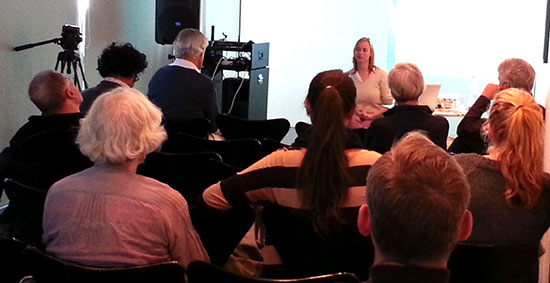 On 26 September 2013, Dr. Bothe held a SASNET lunch seminar on ”Gendered Participation in the Buddhist Himalayas. Sikkim and Bhutan: A comparative study on visions of female participation”. See a youtube recording of the seminar, shot by Talat Bhat.
On 26 September 2013, Dr. Bothe held a SASNET lunch seminar on ”Gendered Participation in the Buddhist Himalayas. Sikkim and Bhutan: A comparative study on visions of female participation”. See a youtube recording of the seminar, shot by Talat Bhat.
In her presentation, Dr. Bothe focused on the Buddhist women from the Kingdom of Bhutan and the Indian state of Sikkim, sharing a similar cultural background rooted in Tantric Buddhism. Given this cultural similarity she set out to explore their political engagement under two different models of governance. The main questions asked is the extent to which these women are empowered to participate in local politics, in particular their subjective understanding of their ability to apply the room that is opened to gain influence at local village meetings. More information.

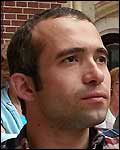 Behravesh is a PhD candidate in the Department of Political Science, working on a thesis project concerning the political psychology of nuclearization and more specifically the nuclear behavior of Iran, Pakistan and North Korea (DPRK). The thesis is entitled ”The Political Psychology of Nuclearization: The Ontological (In)Security Dynamics of States’ Nuclear Behavior”, and is supervised by Catarina Kinnvall. Maysam Behvaresh currently serves as a Senior Editor of the peer-reviewed journal Asian Politics & Policy (Wiley-Blackwell) – where he is in charge of the Media Reviews section – and the Editorial Assistant of the journal Cooperation and Conflict (Sage)
Behravesh is a PhD candidate in the Department of Political Science, working on a thesis project concerning the political psychology of nuclearization and more specifically the nuclear behavior of Iran, Pakistan and North Korea (DPRK). The thesis is entitled ”The Political Psychology of Nuclearization: The Ontological (In)Security Dynamics of States’ Nuclear Behavior”, and is supervised by Catarina Kinnvall. Maysam Behvaresh currently serves as a Senior Editor of the peer-reviewed journal Asian Politics & Policy (Wiley-Blackwell) – where he is in charge of the Media Reviews section – and the Editorial Assistant of the journal Cooperation and Conflict (Sage)
Project abstract: The research concerns the relationship between the states’ nuclear policy-making and their domestic as well as international efforts to obtain ontological security and consolidate their self-conceptions. To demonstrate these psycho-political dynamics in a methodologically clear and adequate manner, the work is more specifically focusing on states with ”revisionist” tendencies, namely Iran, Pakistan, and North Korea, arguing that their pursuit of nuclear capability is largely influenced by self-identity needs, which are often fulfilled at the expense of their material interests. The thesis draws on narrative and discourse analysis as its principal methods of research, which would ideally provide the necessary tools for identifying the chief “narratives of nuclearity” within each state and understanding which narrative is reinforced or otherwise undermined by which major group in the polity-society nexus. In this way, the effect of ontological (in)security on nuclear behavior at the state level may be explored, additionally opening avenues for tackling the notorious “level of analysis” problem in studying emotions in IR.
ICCR Professorship at the department
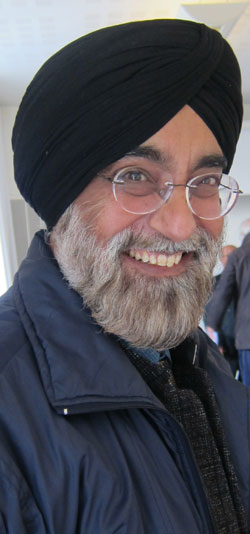 During the academic year 2012-13, Surinder S. Jodhka, Professor of Sociology at the Centre for the Study of Social Systems, School of Social Sciences at Jawaharlal Nehru University (JNU) in Delhi, worked as the third Visiting Indian Council for Cultural Relations (ICCR) Professor at Lund University, hosted by the Department of Political Science. Professor Jodhka was the third Visiting ICCR Professor at Lund University, after Professor Lipi Ghosh 2010/11, and Professor G K Karanth 2011/12. More information on the ICCR professorship.
During the academic year 2012-13, Surinder S. Jodhka, Professor of Sociology at the Centre for the Study of Social Systems, School of Social Sciences at Jawaharlal Nehru University (JNU) in Delhi, worked as the third Visiting Indian Council for Cultural Relations (ICCR) Professor at Lund University, hosted by the Department of Political Science. Professor Jodhka was the third Visiting ICCR Professor at Lund University, after Professor Lipi Ghosh 2010/11, and Professor G K Karanth 2011/12. More information on the ICCR professorship.
Besides his position as Professor at the School of Social Sciences, JNU since 2006, Surinder Jodhka is also a Honorary Fellow at the Indian School of Political Economy in Pune, and during the period 2008–2010, he was the Director for the Indian Institute of Dalit Studies. For five years he was Country Coordinator for the Religions and Development Research Programme, coordinated by University of Birmingham, UK. Previously he has been a Charles Wallace India Trust Fellow at Queens University in Belfast; South Asian Visiting Scholar at University of Oxford; Honorary Visiting Fellow at University of Wisconsin, Madison; and Visiting Associate Professor at University of Bergen, Norway. Besides, Prof. Jodhka has been member of several editorial boards for journals such as Sociology (official journal of the British Sociological Association); Sikh Formations; and Sociological Bulletin, Journal of the Indian Sociological Society. His areas of specialization are Political Sociology; Social and Cultural Identities in contemporary India; Development Studies; Social Stratification; Rural Society and Agrarian Change.
Recently published books are ”Religions, Communities, Development: Changing Contours of Policy and Politics in Contemporary India” (edited with Gurpreet Mahajan): Routledge, New Delhi, 2010; ”Village Society: Culture, Politics and Social Life in Rural India”. Orient Blackswan. Edited, 2012; and ”Changing Caste: Mobility, Ideology, Identity”. Sage Publications, New Delhi. Edited, 2012. The most recent publication is a book entited ”Caste: Oxford India Short Introductions” published by Oxford University Press in July 2012. Go for Prof. Surinder Jodhka’s complete CV.
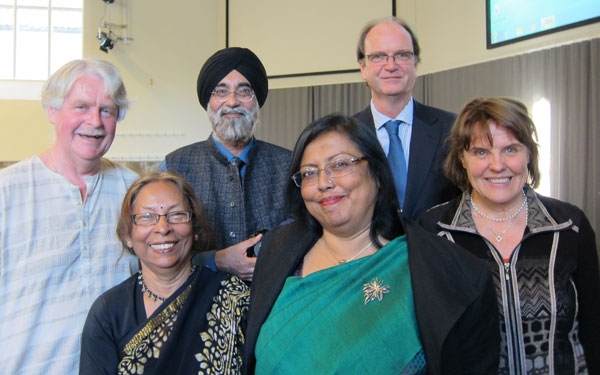
An installation ceremony was organised at Lund University’s Palaestra auditorium on 12th October 2012. Professor Jodhka gave an inaugural lecture on the theme ”Indian Village in the ‘Neo-Liberal’ Times: Changing Economies, Power and Identities”. The informed presentation was based on field work he has carried out in the rural areas of Haryana state in north India. The audience consisted of an interested crowd of Lund University researchers, students and others.
His lecture was preceded by a presentation by the Indian Ambassador to Sweden and Latvia, Ms. Banashri Bose Harrison, who had come to Lund specifically to participate in the installation ceremony. Introductory speeches were also given by Professor Tomas Bergström, Dept. of Political Science, and by Dr. Anna Lindberg, Director, SASNET. More information about the installation seminar.
On Thursday 1 November 2012, Professor Jodhka held a SASNET lecture on ”What’s happening to the countryside: Agrarian Change and the Social Order of Caste in Northwest India”. The seminar is organised in collaboration with the Department of Sociology. More information.
Collaboration with Pakistani researchers
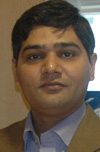 From 2007, the department is involved in a collaboration with the Pak institute for Peace Studies (PIPS) in Lahore, Pakistan. The PIPS Director, Mr. Muhammad Amir Rana, a renowned expert on terrorism and regional strategic issues, visited Lund University in the end of October 2007. On Friday 26 october 2007, he lectured about ‘Pakistan and the radicalization of Islam and the upcoming election‘.
From 2007, the department is involved in a collaboration with the Pak institute for Peace Studies (PIPS) in Lahore, Pakistan. The PIPS Director, Mr. Muhammad Amir Rana, a renowned expert on terrorism and regional strategic issues, visited Lund University in the end of October 2007. On Friday 26 october 2007, he lectured about ‘Pakistan and the radicalization of Islam and the upcoming election‘.
Mr. Rana is the founding member of the PIPS, but has also served in senior positions in prestigious English and Urdu newspapers. He is the author of seven books, including “A to Z of Jihad organizations in Pakistan“, considered to be the first serious attempt to unfold the jihadist organizations’ internal affairs, disputes and infightings, and their impact on militant groups. Mr. Rana is also a visiting fellow at the International Centre for Political Violence and Terrorism Research at Nanyang Technological University in Singapore.
Development Studies Programme
In September 2009, Lund University’s Dept. of Social and Economic Geography launched a new Bachelor of Science programme in Development Studies with a major in Economic History, Human Geography, Political Science or Sociology. The programme is interdisciplinary and focuses on economic, social and political processes and their linkages to development cooperation. The duration of the programme is three years. It is organised in collaboration with the Department of Political Science, and also the Dept. of Economic History and the Dept. of Sociology.
More information about the Programme.